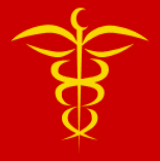|
Examining the Nose
|
External Nose:
-
Inspect for deviations in shape.
-
Observe for discharge from the nares, (watery, mucoid, purulent)
from one or both sides.
-
A bilateral watery discharge associated with sneezing and nasal congestion indicate an allergy.
-
Mucus discharge is typical of rhinitis while bilateral purulent (pus) discharge is typical of an upper respiratory infection
(URI).
-
One-sided purulent, thick greenish and extremely malodorous discharge may indicate a foreign body.
Nasal Cavity:
Examination of the Sinuses:
-
To palpate the frontal sinus for tenderness use your thumbs and press up from under the bony brow (right under eyebrows).
-
Avoid pressure on the eyes.
-
Then press up on each maxillary sinus by pressing under the zygomatic processes.
-
Next percuss the sinus areas to detect tenderness.
-
Lightly tap directly of each sinus area with your finger.
-
Another method is to transilluminate the sinuses in a dark room.
-
Place a light under each brow close to the nose.
-
Shield the light with your hand.
-
Normally you will see a dim red glow as light is transmitted through the air filled sinus.
-
Repeat the process with light shinning downward just below the inner aspect of each eye.
-
Look through the open mouth for the reddish glow.
-
Absence of the red glow suggest thickened secretions in the sinus.
For further information, read:
Otorhinolaryngology,
in The SeaBee Operational Medical and Dental Guide
Aviation
Ear Nose and Throat Medicine, in Operational Settings
ENT in Hospital
Corpsman Sickcall Screeners Handbook |
|
Approved for public release;
Distribution is unlimited.
The listing of any non-Federal product in this CD is not an endorsement of the
product itself, but simply an acknowledgement of the source.
Bureau of Medicine and Surgery
Department of the Navy
2300 E Street NW
Washington, D.C
20372-5300 |
Operational Medicine
Health Care in Military Settings
CAPT Michael John Hughey, MC, USNR
NAVMED P-5139
January 1, 2001 |
United States Special Operations
Command
7701 Tampa Point Blvd.
MacDill AFB, Florida
33621-5323 |
*This web version is provided by
The Brookside Associates Medical Education Division. It contains
original contents from the official US Navy NAVMED P-5139, but has been
reformatted for web access and includes advertising and links that were not
present in the original version. This web version has not been approved by the
Department of the Navy or the Department of Defense. The presence of any
advertising on these pages does not constitute an endorsement of that product or
service by either the US Department of Defense or the Brookside Associates. The
Brookside Associates is a private organization, not affiliated with the United
States Department of Defense.
Contact Us · · Other
Brookside Products

|
|
Operational Medicine 2001
Contents
|
|



 To examine the nasal cavity spread the nares by pushing up on the tip of the nose.
To examine the nasal cavity spread the nares by pushing up on the tip of the nose.